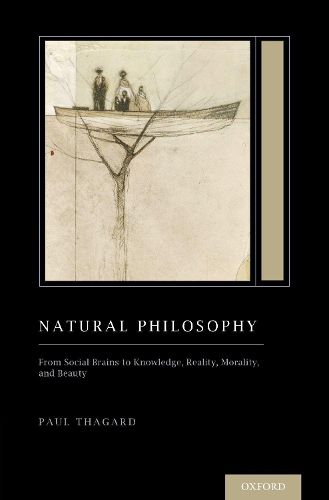Readings Newsletter
Become a Readings Member to make your shopping experience even easier.
Sign in or sign up for free!
You’re not far away from qualifying for FREE standard shipping within Australia
You’ve qualified for FREE standard shipping within Australia
The cart is loading…






Paul Thagard uses new accounts of brain mechanisms and social interactions to forge theories of mind, knowledge, reality, morality, justice, meaning, and the arts. Natural Philosophy brings new methods for analyzing concepts, understanding values, and achieving coherence. It shows how to unify the humanities with the cognitive and social sciences. How can people know what is real and strive to make the world better? Philosophy is the attempt to answer general questions about the nature of knowledge, reality, and values. Natural Philosophy pursues these questions by drawing heavily on the sciences and finds no room for supernatural entities such as souls, gods, and possible worlds. It provides original accounts of the traditional branches of philosophy, including epistemology, metaphysics, ethics, and aesthetics. Rather than reducing the humanities to the sciences, this book displays fertile interconnections that show that philosophical questions and artistic practices can be much better understood by considering how human brains operate and interact in social contexts. The sciences and the humanities are interdependent, because both the natural and social sciences cannot avoid questions about methods and values that are primarily the province of philosophy. This book belongs to a trio that includes Brain-Mind: From Neurons to Consciousness and Creativity and Mind-Society: From Brains to Social Sciences and Professions. They can be read independently, but together they make up a Treatise on Mind and Society that provides a unified and comprehensive treatment of the cognitive sciences, social sciences, professions, and humanities.
$9.00 standard shipping within Australia
FREE standard shipping within Australia for orders over $100.00
Express & International shipping calculated at checkout
Paul Thagard uses new accounts of brain mechanisms and social interactions to forge theories of mind, knowledge, reality, morality, justice, meaning, and the arts. Natural Philosophy brings new methods for analyzing concepts, understanding values, and achieving coherence. It shows how to unify the humanities with the cognitive and social sciences. How can people know what is real and strive to make the world better? Philosophy is the attempt to answer general questions about the nature of knowledge, reality, and values. Natural Philosophy pursues these questions by drawing heavily on the sciences and finds no room for supernatural entities such as souls, gods, and possible worlds. It provides original accounts of the traditional branches of philosophy, including epistemology, metaphysics, ethics, and aesthetics. Rather than reducing the humanities to the sciences, this book displays fertile interconnections that show that philosophical questions and artistic practices can be much better understood by considering how human brains operate and interact in social contexts. The sciences and the humanities are interdependent, because both the natural and social sciences cannot avoid questions about methods and values that are primarily the province of philosophy. This book belongs to a trio that includes Brain-Mind: From Neurons to Consciousness and Creativity and Mind-Society: From Brains to Social Sciences and Professions. They can be read independently, but together they make up a Treatise on Mind and Society that provides a unified and comprehensive treatment of the cognitive sciences, social sciences, professions, and humanities.